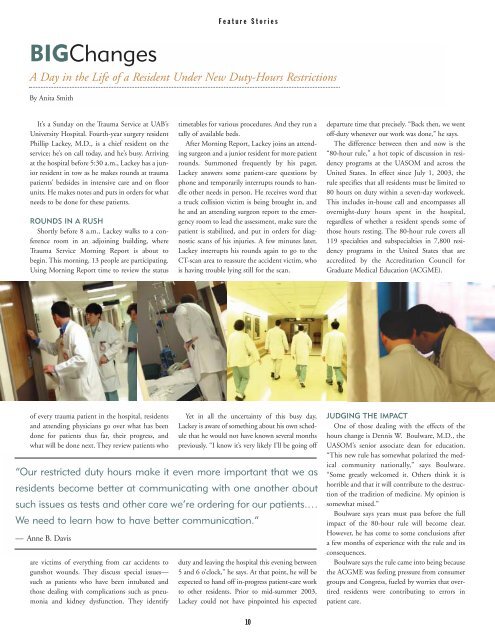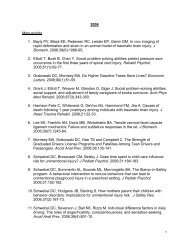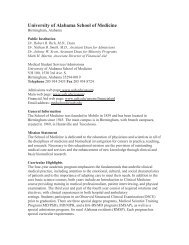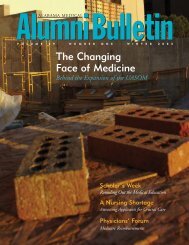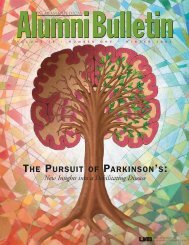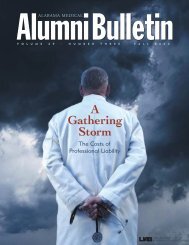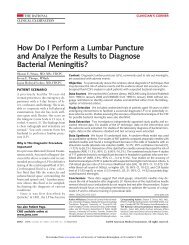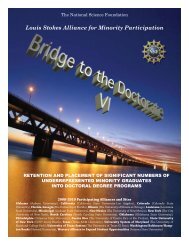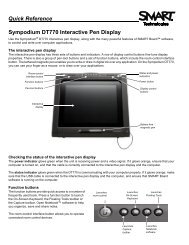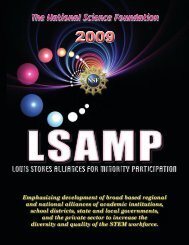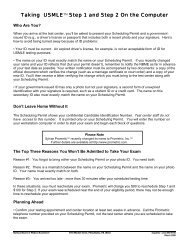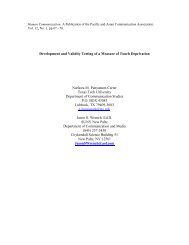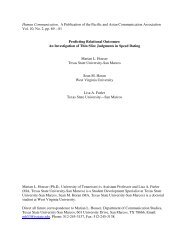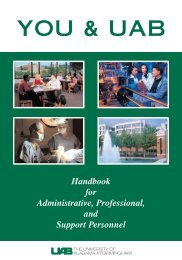uasom doctors uasom doctors - University of Alabama at Birmingham
uasom doctors uasom doctors - University of Alabama at Birmingham
uasom doctors uasom doctors - University of Alabama at Birmingham
You also want an ePaper? Increase the reach of your titles
YUMPU automatically turns print PDFs into web optimized ePapers that Google loves.
Fe<strong>at</strong>ure Stories<br />
BIGChanges<br />
A Day in the Life <strong>of</strong> a Resident Under New Duty-Hours Restrictions<br />
By Anita Smith<br />
It’s a Sunday on the Trauma Service <strong>at</strong> UAB’s<br />
<strong>University</strong> Hospital. Fourth-year surgery resident<br />
Phillip Lackey, M.D., is a chief resident on the<br />
service; he’s on call today, and he’s busy. Arriving<br />
<strong>at</strong> the hospital before 5:30 a.m., Lackey has a junior<br />
resident in tow as he makes rounds <strong>at</strong> trauma<br />
p<strong>at</strong>ients’ bedsides in intensive care and on floor<br />
units. He makes notes and puts in orders for wh<strong>at</strong><br />
needs to be done for these p<strong>at</strong>ients.<br />
ROUNDS IN A RUSH<br />
Shortly before 8 a.m., Lackey walks to a conference<br />
room in an adjoining building, where<br />
Trauma Service Morning Report is about to<br />
begin. This morning, 13 people are particip<strong>at</strong>ing.<br />
Using Morning Report time to review the st<strong>at</strong>us<br />
timetables for various procedures. And they run a<br />
tally <strong>of</strong> available beds.<br />
After Morning Report, Lackey joins an <strong>at</strong>tending<br />
surgeon and a junior resident for more p<strong>at</strong>ient<br />
rounds. Summoned frequently by his pager,<br />
Lackey answers some p<strong>at</strong>ient-care questions by<br />
phone and temporarily interrupts rounds to handle<br />
other needs in person. He receives word th<strong>at</strong><br />
a truck collision victim is being brought in, and<br />
he and an <strong>at</strong>tending surgeon report to the emergency<br />
room to lead the assessment, make sure the<br />
p<strong>at</strong>ient is stabilized, and put in orders for diagnostic<br />
scans <strong>of</strong> his injuries. A few minutes l<strong>at</strong>er,<br />
Lackey interrupts his rounds again to go to the<br />
CT-scan area to reassure the accident victim, who<br />
is having trouble lying still for the scan.<br />
departure time th<strong>at</strong> precisely. “Back then, we went<br />
<strong>of</strong>f-duty whenever our work was done,” he says.<br />
The difference between then and now is the<br />
“80-hour rule,” a hot topic <strong>of</strong> discussion in residency<br />
programs <strong>at</strong> the UASOM and across the<br />
United St<strong>at</strong>es. In effect since July 1, 2003, the<br />
rule specifies th<strong>at</strong> all residents must be limited to<br />
80 hours on duty within a seven-day workweek.<br />
This includes in-house call and encompasses all<br />
overnight-duty hours spent in the hospital,<br />
regardless <strong>of</strong> whether a resident spends some <strong>of</strong><br />
those hours resting. The 80-hour rule covers all<br />
119 specialties and subspecialties in 7,800 residency<br />
programs in the United St<strong>at</strong>es th<strong>at</strong> are<br />
accredited by the Accredit<strong>at</strong>ion Council for<br />
Gradu<strong>at</strong>e Medical Educ<strong>at</strong>ion (ACGME).<br />
<strong>of</strong> every trauma p<strong>at</strong>ient in the hospital, residents<br />
and <strong>at</strong>tending physicians go over wh<strong>at</strong> has been<br />
done for p<strong>at</strong>ients thus far, their progress, and<br />
wh<strong>at</strong> will be done next. They review p<strong>at</strong>ients who<br />
are victims <strong>of</strong> everything from car accidents to<br />
gunshot wounds. They discuss special issues—<br />
such as p<strong>at</strong>ients who have been intub<strong>at</strong>ed and<br />
those dealing with complic<strong>at</strong>ions such as pneumonia<br />
and kidney dysfunction. They identify<br />
Yet in all the uncertainty <strong>of</strong> this busy day,<br />
Lackey is aware <strong>of</strong> something about his own schedule<br />
th<strong>at</strong> he would not have known several months<br />
previously. “I know it’s very likely I’ll be going <strong>of</strong>f<br />
“Our restricted duty hours make it even more important th<strong>at</strong> we as<br />
residents become better <strong>at</strong> communic<strong>at</strong>ing with one another about<br />
such issues as tests and other care we’re ordering for our p<strong>at</strong>ients.…<br />
We need to learn how to have better communic<strong>at</strong>ion.”<br />
— Anne B. Davis<br />
duty and leaving the hospital this evening between<br />
5 and 6 o’clock,” he says. At th<strong>at</strong> point, he will be<br />
expected to hand <strong>of</strong>f in-progress p<strong>at</strong>ient-care work<br />
to other residents. Prior to mid-summer 2003,<br />
Lackey could not have pinpointed his expected<br />
JUDGING THE IMPACT<br />
One <strong>of</strong> those dealing with the effects <strong>of</strong> the<br />
hours change is Dennis W. Boulware, M.D., the<br />
UASOM’s senior associ<strong>at</strong>e dean for educ<strong>at</strong>ion.<br />
“This new rule has somewh<strong>at</strong> polarized the medical<br />
community n<strong>at</strong>ionally,” says Boulware.<br />
“Some gre<strong>at</strong>ly welcomed it. Others think it is<br />
horrible and th<strong>at</strong> it will contribute to the destruction<br />
<strong>of</strong> the tradition <strong>of</strong> medicine. My opinion is<br />
somewh<strong>at</strong> mixed.”<br />
Boulware says years must pass before the full<br />
impact <strong>of</strong> the 80-hour rule will become clear.<br />
However, he has come to some conclusions after<br />
a few months <strong>of</strong> experience with the rule and its<br />
consequences.<br />
Boulware says the rule came into being because<br />
the ACGME was feeling pressure from consumer<br />
groups and Congress, fueled by worries th<strong>at</strong> overtired<br />
residents were contributing to errors in<br />
p<strong>at</strong>ient care.<br />
10


